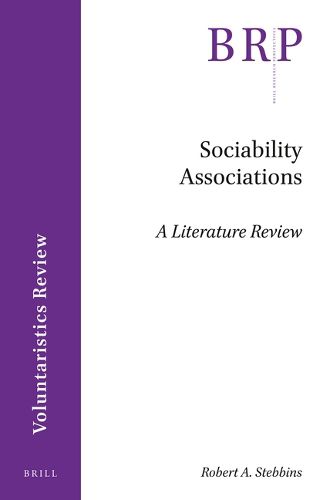Readings Newsletter
Become a Readings Member to make your shopping experience even easier.
Sign in or sign up for free!
You’re not far away from qualifying for FREE standard shipping within Australia
You’ve qualified for FREE standard shipping within Australia
The cart is loading…






Friendly social relations during free time, referred to here as leisure-based sociability, constitute a prominent reward of participation in groups based on voluntary membership, consisting for this review mainly of amateurs, hobbyists, volunteers, and their associations. This benefit is analyzed according to two subtypes: sociable nonprofit associations and social clubs. The goal of this issue of the Voluntaristics Review is to examine the leisure component of these two subtypes as framed in the serious leisure perspective (SLP), put nonprofit sociability in organizational context, and then review the empirical literature bearing on it. Excluded are the studies and theoretic treatises approaching nonprofit groups from another angle (e.g., organizational structure, management issues, funding sources, governmental regulation, type of employment). Specifically, this review centers on the relevant publications listed in the SLP website bearing on amateurs, hobbyists, and career volunteers (the serious pursuits), casual leisure, and project-based interests. It includes several extensions of the theory and research on leisure-related aspects of aging and retirement, arts and science administration, library and information science, positive psychology, therapeutic recreation and disability studies, and tourism and event analysis. Compared with the specialties in leisure studies, the SLP casts by far the broadest theoretical and empirical net in that interdisciplinary field. The research reviewed shows that such talk-generically known as socializing-reflects one or more of 14 themes. In general, members find sociability in these clubs and associations in and around the core activities they pursue there and on which the two subtypes have formed. The studies reviewed, taken together, provide considerable validation of the proposition that leisure-based sociability is a prominent reward of participating in a multitude of volunteer groups. Leisure-based sociability is essentially micro-analytic, but when viewed through the lens of the SLP, it can be further understood using meso and macro levels of analysis.
$9.00 standard shipping within Australia
FREE standard shipping within Australia for orders over $100.00
Express & International shipping calculated at checkout
Friendly social relations during free time, referred to here as leisure-based sociability, constitute a prominent reward of participation in groups based on voluntary membership, consisting for this review mainly of amateurs, hobbyists, volunteers, and their associations. This benefit is analyzed according to two subtypes: sociable nonprofit associations and social clubs. The goal of this issue of the Voluntaristics Review is to examine the leisure component of these two subtypes as framed in the serious leisure perspective (SLP), put nonprofit sociability in organizational context, and then review the empirical literature bearing on it. Excluded are the studies and theoretic treatises approaching nonprofit groups from another angle (e.g., organizational structure, management issues, funding sources, governmental regulation, type of employment). Specifically, this review centers on the relevant publications listed in the SLP website bearing on amateurs, hobbyists, and career volunteers (the serious pursuits), casual leisure, and project-based interests. It includes several extensions of the theory and research on leisure-related aspects of aging and retirement, arts and science administration, library and information science, positive psychology, therapeutic recreation and disability studies, and tourism and event analysis. Compared with the specialties in leisure studies, the SLP casts by far the broadest theoretical and empirical net in that interdisciplinary field. The research reviewed shows that such talk-generically known as socializing-reflects one or more of 14 themes. In general, members find sociability in these clubs and associations in and around the core activities they pursue there and on which the two subtypes have formed. The studies reviewed, taken together, provide considerable validation of the proposition that leisure-based sociability is a prominent reward of participating in a multitude of volunteer groups. Leisure-based sociability is essentially micro-analytic, but when viewed through the lens of the SLP, it can be further understood using meso and macro levels of analysis.